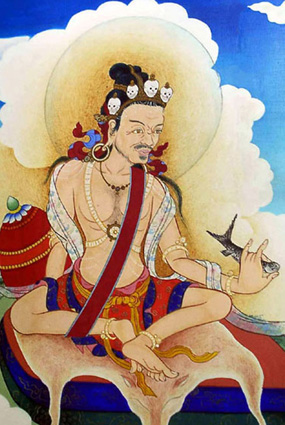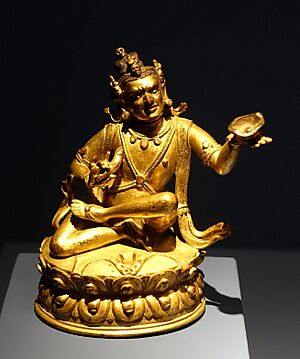Tilopa facts for kids
Tilopa (born 988, died 1069) was an important Indian Buddhist monk. He was a key figure in the Kagyu lineage of Tibetan Buddhism, which is a special way of practicing Buddhism.
Tilopa lived near the Ganges River in India. He practiced a type of spiritual training called tantra and was known as a mahasiddha, which means a great spiritual master. He focused on advanced spiritual practices to help people reach Buddhahood, a state of complete enlightenment.
He was known for understanding many different tantric teachings. He also taught about insight and a practice called Mahamudra. He passed on special methods, now known as the Six Yogas of Naropa, and also guru yoga, which is about connecting with a spiritual teacher. His most famous student was Naropa.
Contents
Tilopa's Early Life
Tilopa was born into a family of priests. He decided to become a monk after a special vision. A dakini, who is like a female spiritual guide, told him to become a traveling monk. She also told him that his true parents were not the people who raised him, but rather "primordial wisdom" (deep, original understanding) and "universal voidness" (the idea that everything is empty of a fixed self).
Following the dakini's advice, Tilopa became a monk and a very smart scholar. The dakini kept visiting him, guiding him on his spiritual journey towards enlightenment.
He was born in either Chativavo or Jagora, both places in Bengal, India.
His Teachers and Journeys
Tilopa traveled all over India to learn from many different spiritual teachers, called gurus. Here are some of the important lessons he learned:
- From Saryapa, he learned about inner heat (called tummo). This is a meditation practice to generate warmth in the body.
- From Nagarjuna, he learned about radiant light and the illusory body. These teachings help understand how things appear to us.
- From Lawapa, he learned dream yoga, a practice where you become aware and work with your dreams.
- From Sukhasiddhi, he learned about life, death, and the bardo. The bardo is the state between death and rebirth.
- From Indrabhuti, he learned about wisdom (called prajña).
- From Matangi, he learned special teachings about life and death.
During one of his meditations, Tilopa had a vision of Vajradhara, who is seen as the ultimate Buddha. According to stories, Vajradhara directly taught Tilopa the entire practice of mahamudra. After this, Tilopa meditated in caves for many years. He even used heavy chains to help him stay in the correct meditation posture.
Tilopa is considered the "grandfather" of today's Kagyu Lineage. His most important student, Naropa, continued his teachings and passed them on.
There are two caves at the Pashupatinath Temple in Nepal where Tilopa is said to have achieved great spiritual powers and taught Naropa.
Tilopa's Teachings
Six Words of Advice
Tilopa gave Naropa a very important teaching called the "Six Words of Advice." These words are like "six nails of key points" because they help you understand important ideas very clearly. The original words were in an old Indian language, but they were translated into Tibetan.
Here are the Six Words of Advice:
| Simple Meaning | Tibetan (Wylie transliteration) | ||
|---|---|---|---|
| 1 | Don't recall | Let go of what has already happened. | mi mno |
| 2 | Don't imagine | Let go of thoughts about what might happen in the future. | mi bsam |
| 3 | Don't think | Let go of what is happening right now. | mi sems |
| 4 | Don't examine | Don't try to figure everything out. | mi dpyod |
| 5 | Don't control | Don't try to make things happen. | mi sgom |
| 6 | Rest | Just relax, right now, and rest. | rang sar bzhag |
Another way these words have been translated is:
- No thought, no reflection, no analysis,
- No cultivation, no intention;
- Let it settle itself.
This means to let your mind be natural and not try to force it to do anything.
Mahamudra Instructions
Tilopa also taught Naropa about mahamudra through a song called "The Ganges Mahamudra." One part of the song says:
- People who don't understand Mahamudra
- Only find struggle in the cycle of life and death.
- Feel kindness for those who are always worried!
- If you are tired of pain and want to be free, follow a good teacher,
- Because when their blessing touches your heart, your mind becomes free.
Attachment and Enjoyment
One of Tilopa's most famous sayings is: "The problem is not enjoyment; the problem is attachment." This means that enjoying things is fine, but problems start when we become too attached to them and can't let them go.
See also
 In Spanish: Tilopa para niños
In Spanish: Tilopa para niños
- Erdne Ombadykow, a person believed to be a reincarnation of Tilopa
- History of Tibet
 | Janet Taylor Pickett |
 | Synthia Saint James |
 | Howardena Pindell |
 | Faith Ringgold |



